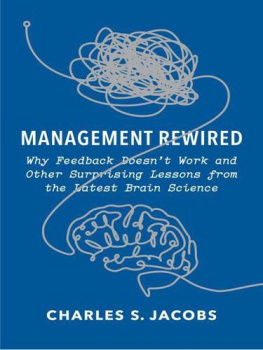Table of Contents

PORTFOLIO
Published by the Penguin Group
Penguin Group (USA) Inc., 375 Hudson Street, New York, New York 10014, U.S.A.
Penguin Group (Canada), 90 Eglinton Avenue East, Suite 700, Toronto,
Ontario, Canada M4P 2Y3 (a division of Pearson Penguin Canada Inc.)
Penguin Books Ltd, 80 Strand, London WC2R 0RL, England
Penguin Ireland, 25 St. Stephens Green, Dublin 2, Ireland (a division of Penguin Books Ltd)
Penguin Books Australia Ltd, 250 Camberwell Road, Camberwell, Victoria 3124, Australia
(a division of Pearson Australia Group Pty Ltd)
Penguin Books India Pvt Ltd, 11 Community Centre, Panchsheel Park,
New Delhi110 017, India
Penguin Group (NZ), 67 Apollo Drive, Rosedale, North Shore 0632, New Zealand
(a division of Pearson New Zealand Ltd)
Penguin Books (South Africa) (Pty) Ltd, 24 Sturdee Avenue, Rosebank,
Johannesburg 2196, South Africa
Penguin Books Ltd, Registered Offices: 80 Strand, London WC2R 0RL, England
First published in 2009 by Portfolio, a member of Penguin Group (USA) Inc.
Copyright Charles S. Jacobs, 2009
All rights reserved
LIBRARY OF CONGRESS CATALOGING-IN-PUBLICATION DATA
Jacobs, Charles S.
Management rewired : why feedback doesnt work and other surprising
lessons from the latest brain science / Charles S. Jacobs.
p. cm.
Includes bibliographical references and index.
eISBN : 978-1-101-05025-5
1. Psychology, Industrial. 2. Interpersonal relationsPsychological aspects.
3. Personnel managementPsychological aspects. 4. Organizational behavior.
5. Management. I. Title.
HF5548.8.J24 2009
658.0019dc22 2009001724
Without limiting the rights under copyright reserved above, no part of this publication may be reproduced, stored in or introduced into a retrieval system, or transmitted, in any form or by any means (electronic, mechanical, photocopying, recording or otherwise), without the prior written permission of both the copyright owner and the above publisher of this book.
The scanning, uploading, and distribution of this book via the Internet or via any other means without the permission of the publisher is illegal and punishable by law. Please purchase only authorized electronic editions and do not participate in or encourage electronic piracy of copyrightable materials. Your support of the authors rights is appreciated.
http://us.penguingroup.com
To Jonas, the teacher who taught me the value of ideas,
and to my daughters, Julia and Emma,
who will only listen to stories
INTRODUCTION
I t turns out that most of what we thought we knew about management is probably wrong. New research shows that our emotions lead to better business decisions than our logic. Positive and negative feedback not only dont improve performance, they tend to make it worse. The quantifiable objectives that are a critical part of our strategic plans cause us to focus on the short term at the expense of the long term. Many of the management practices weve taken for granted are not only ineffective, they actually produce the opposite of what we intend.
At the same time, new approaches that have been proven to produce superior performance cant help but strike us as unreasonable. Its been demonstrated that smaller rewards tend to be more motivational than larger ones, that being competitive is often the best way to encourage cooperation, and that the managers who produce the best results are the ones who do the least managing.
The latest developments in brain science are teaching us a better way to manage, but they also challenge our common sense. Using functional magnetic resonance imaging, or the f MRI as its known in the field, scientists are now able to watch the brain at work, and what theyre learning is mind-boggling. Not only have they located the areas of the brain that are responsible for our emotions, our reason, and even our moral character; theyve also discovered what makes us empathetic, able to learn, and take pleasure in our work. Theyve even figured out why teenagers drive their parents so crazy.
But perhaps the most surprising discovery has come from mapping the path information travels from our sense organs to our awareness of the world we live in. Not only are the perceptual areas of the brain involved, so are the areas responsible for our memories, our feelings, our beliefs, and our aspirations. Our minds arent objectively recording our experience of the world; theyre creating it, and that creation is influenced by everything else going on in the brain. Each of us lives in a mental world of our own making.
This isnt just some abstract, philosophical issue. It has enormous practical ramifications for how we live and work. The world we know is only what we think it to be, and we cant assume other people will think the same way we do. In fact, we know they wont. Since our customers, employees, peers, and bosses all see things differently than we do, the way we act toward them doesnt necessarily produce the results we expect or want.
While most of us accept that others see the world differently than we do, we trust in our objective, logical reasoning to resolve conflicting perceptions. But the f MRI also shows us that objective reasoning has nothing to do with the way we solve problems, make decisions, and plan for the future. At best, logic is just a way to justify conclusions we have already reached unconsciously.
This new understanding of how the mind works needs to be incorporated into all of our thinking about business. The resulting management practices may seem illogical, but theyll produce better performance. Our organizations will be more focused and efficient, and our strategies more effective at creating a sustainable advantage. Well also be able to meaningfully transform businesses rapidly, and our leadership will bring out the best in people. The improvement in the bottom line will not just be incremental, but a quantum leap.
Any manager whos been around for a while has heard bold claims like this before only to end up disappointed by the latest and greatest initiative that doesnt live up to its promise. But brain sciences transformation of management isnt just about another new technique or model. Its about shifting our paradigm to incorporate the hard data of science and fundamentally changing the way we think about business. When we do, were able to gain access to an integrated set of management practices that really do deliver on the promise of superior performance.
With such enormous potential, why hasnt there been more interest in applying the insights of brain science to management? The reason is that our logical thinking excels at dividing things up and categorizing them. While this enables us to organize vast amounts of knowledge, it also separates what we know into specialties with their own unique language and ways of thinking. Its a daunting task for a layperson to come to grips with the complex Lat inate terms of neuroscience. Businesspeople and brain scientists living in their own worlds have difficulty communicating and appreciating one anothers concerns.
But this problem is an opportunity for those in business who are able to bridge the gap. It immediately gives them a leg up on the competitors who dont appreciate how the findings of brain science can be applied to their businesses. Nor is the application difficult once the implications of the basic discoveries are understood. There are no complicated algorithms or complex processes to master. With a just subtle shift of perspective it becomes clear what approaches dont work and how to generate ones that do. All you need to do is use the mind the way we now know it naturally works.








